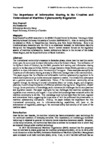The Importance of Information Sharing in the Creation and Enforcement of Maritime Cybersecurity Regulation
| dc.contributor.author | Hopcraft, Rory | |
| dc.date.accessioned | 2020-12-16T09:47:15Z | |
| dc.date.issued | 2019-04-10 | |
| dc.identifier.uri | http://hdl.handle.net/10026.1/16749 | |
| dc.description.abstract |
The international community’s response to Somalian piracy, shows how the maritime sector relies upon its community to share information about the threats it faces. The ratification of the Djibouti Code of Conduct, by the IMO, provides both training and information sharing centres to the East coast of Africa. NATO, through Operation Ocean Shield, provides a military platform to share information about the security of the region. These examples exemplify the importance of information sharing as a way to effectively manage risks in the maritime sector. This paper argues that for effective and enforceable maritime cybersecurity regulation to be created and implemented, a similar communal response is needed. The threats from cyberspace are a genuine concern for all stakeholders. Hence, if the international community comes together through the sharing of crucial information about the threats, targets, and mitigation practices, it could allow the creation of effective cybersecurity regulation. Regulation, created through the co-production of knowledge, could overcome the challenges that current practices and regulation cannot. The paper highlights the key challenges that maritime cybersecurity regulation must overcome, and argues it must utilise the knowledge base contained within the maritime community to do this. This knowledge must include input from the local, regional and international levels, suggesting the importance of both the public and the private sector in maritime cybersecurity discussions. Finally, the paper stresses the importance that this international community, and its information-sharing capabilities, will have on the enforcement of regulation, assisting in the continued safety and security of all users of the maritime space. | |
| dc.language.iso | en | |
| dc.title | The Importance of Information Sharing in the Creation and Enforcement of Maritime Cybersecurity Regulation | |
| dc.type | conference | |
| plymouth.date-start | 2019-04-10 | |
| plymouth.date-finish | 2019-04-11 | |
| plymouth.conference-name | 3rd NATO Maritime Interdiction Operational Training Centre Conference on Cyber Security in Maritime Domain | |
| plymouth.organisational-group | /Plymouth | |
| plymouth.organisational-group | /Plymouth/Faculty of Science and Engineering | |
| plymouth.organisational-group | /Plymouth/Users by role | |
| plymouth.organisational-group | /Plymouth/Users by role/Academics | |
| dcterms.dateAccepted | 2019-04-10 | |
| dc.rights.embargodate | 2023-7-18 | |
| dc.rights.embargoperiod | Not known | |
| rioxxterms.licenseref.uri | http://www.rioxx.net/licenses/all-rights-reserved | |
| rioxxterms.licenseref.startdate | 2019-04-10 | |
| rioxxterms.type | Conference Paper/Proceeding/Abstract |


